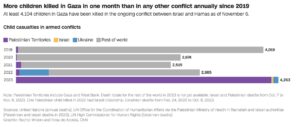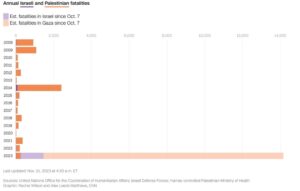By Asanga Abeyagoonasekera 1 December 2023
“It is the job of thinking people not to be on the side of the executioners.” Albert Camus
What happens when victims become executioners? Then, the dead will be left to be the innocent.
Ordinary civilians, women and children who died and continue to die in Israel and Gaza are the innocent. 1,200 Israelis were killed, with over 200 hostages taken to Gaza by Hamas on October 8th, resulting in 14,000 Palestinians killed in less than two months, reports BBC. More than four out of ten killed are children in Gaza (See graph).
Most evenings, I watch the news with my wife. Recently, she has stopped watching the news, a continuous disturbance from the horror depicted in mainstream news covering the Israel-Hamas war in Gaza. When tiny babies die without power in incubators at al-Shifa Hospital in Gaza, and disfigured bodies wounded by shrapnel, echoed by human agony and screams, are the gruesome footage captured in the news, it is too much for a teacher at an elementary school who works with children the whole day. In less than a month, the world will celebrate Christ’s birth. Palestine, the birthplace of Christ, is soaked in blood, and children living and yet to be born will not be spared. There is some relief with the four-day cease-fire that began on November 24th in Gaza as part of an agreement that Qatar helped broker. However, Israeli Prime Minister Benjamin Netanyahu said he would continue with the war after the cease-fire expires. The weapons production lines with precision-guided munitions, small-diameter bombs, artillery ammunition, Iron Dome systems, interceptors and other equipment are in continuous production. The defence officials have ensured a “steady flow of weapons continuing to flow into Israel.” and also to Ukraine.
Declining Moral Leadership
The international order is broken, incapable of resolving the two conflicts where the West and the rest, Iran-backed by China and Russia, are divided in geopolitical contours. The narrative and deep polarization are visible from the media outlets, such as CNN and Aljazeera, where an irrational justification is pushed to you, unpalatable to digest to a rational mind to “justify execution” as the only solution. With the rising protests for the war in Gaza all over the world, including the US, a diminishing ‘Moral Leadership’ once promised is questioned by the US public.
In January 2021, the Atlantic flagged that America Desperately Needs a New Age of Moral Leadership, seeing the newly elected president, Biden, as the torch bearer and someone who could recalibrate the moral compass messed up by his predecessor, Trump. Today, what materialized at the tail end of Biden’s presidency is that Americans are puzzled by ‘Moral leadership’. War in Ukraine and Gaza are seen as byproducts of US hegemony, according to many I interviewed in Asia during my recent visit. Another dangerous perception has evolved around US interventions and exit; “they will abandon,” said a senior scholar. Precipitous withdrawal from Afghanistan and Iraq justifies this comment. It is as if confidence building on US policy is required in many nations; the international implications for US credibility are at a low point with the existing wars in Ukraine and Gaza. Apart from the wars and US inconsistent policy, an assertive and rising China challenging US leadership is visible, a focus in the upcoming US presidential race.
Three-front confrontation
There is a concatenation and escalation in crises in three geographies. According to the career diplomat, former foreign secretary of India Kanwal Sibal, “There is no victory in Ukraine; America cannot sustain a three-front confrontation”, referring to Ukraine, Gaza, and Taiwan. Sibal explained with clarity from his years of experience in diplomacy at the Indian Army (CLAWS) Chanakya dialogue in India, where I was present in the audience—from the 90s, US military planners held to what was known as the “two-war” standard to fight two simultaneous wars against regional powers. Trump administration altered the policy to a “one-war” standard, a commitment to be able to resist either war in Europe or Asia, but not both at the same time. Biden administration continued this policy. What you see is a two-front battle in Europe, the Middle East and one emerging in Taiwan. There are no apparent signs of an end to the Ukraine and Gaza battles while Chinese fighter jets and warships menace Taiwan with increasing frequency, with looming elections in Taiwan likely to bring more tumult. China and Russia are more assertive, and non-aligned nations, including India and Turkey, are shaping an alternative global south.
India’s foreign minister, Dr.Subrahmanyam Jaishankar, noted that the US is facing the “long-term consequences of Iraq and Afghanistan”—a gesture to two failed wars with relative economic decline, “is adjusting to a multipolar world”. The Multipolarity accepted by many nations, departing the US hegemony, there is a clear consensus among many countries, including India, do not wish to be a “rule taker” but chart their future as a “rule giver”. With multiple geopolitical contests and confrontations, it is clear we require geopolitical multi-tasking, as the Economist points to the American metaphor “walking and chewing gum,” referring to performing two trivial activities simultaneously. Unfortunately, there has been an apparent failure in the ‘geopolitical multi-tasking’, and creating a ‘hotline’ to pick up the phone for direct communication is limiting to the top, weakening the institutional level strengthening. An inclusive economic and security architecture in the Indo-Pacific has so far proved elusive and will remain the same if it is left to the top leadership. There is also a clear gap in the thinking with like-minded partners. What’s perceived in Washington is not what I have captured from my interviews in India, Dubai, Thailand, and Colombo. Most don’t see a Ukraine victory over Russia or a strong US. The like-minded allied position in the three contested geographies of Europe, the Middle East and Taiwan somewhat differs from Washington’s thinking. In the Indo-Pacific, Richard Heydarian explains, “ I think in the Philippines there is enough realism to appreciate that Biden needs to establish some guardrails in its bilateral relations with China.” The question is, how do you establish guardrails by taking a passive China posture?
Passive Posture at APEC
John Kerry and Xie Zhenhua, securing the triple renewable energy capacity globally by 2030 to accelerate the substitution for coal, oil and gas generation is a definite meaningful achievement in power sector emission reduction. The climate initiative was formulated outside the APEC summit where Xi and Biden met. The Two leaders installed two guardrails on ‘military-to-military communication’ to avoid clashes near the East and South China Seas and the dangers of AI, where autonomous weapons fall outside the loop of human decision-making. While the rhetoric is promising, one should understand that ‘military to military communication’ does not mean China will stop its strategic expansion, double down on “artificial islands”, “its ambition in Taiwan”, “democratic suppression in Hong Kong”, and “debt and strategic traps” in many geographies.
National security trumps everything else when the two big Superpowers meet, while in the US, Donald J. Trump waits to take over the White House. There is a saying, “When elephants fight, the grass suffers, but when they make love, the grass suffers also.” The Founding Father of Singapore, Lee Kuan Yew, used this quote to describe how Singapore is affected by big powers. Many nations and actors will be victims of whatever the outcome of the Xi-Biden bilateral in San Francisco. Referring to Xi and Biden’s meeting at APEC in San Francisco, “Leaders talking is a good thing, But the question here is, what is the content of your conversation?”, said Uyghur journalist Kasim Kashgar, explaining his pain from a documentary aired at National Press Club in Washington DC at the same time of APEC. What was the content of the discussion? And was the messaging right on the Xi-Biden bonhomie in San Francisco? Was President Biden firmly articulating his position concerning China’s belligerent behaviour in many geographies? Biden deliberately downplayed, despite the concerns raised by many actors. This result will have more impact on Biden than Xi since Biden will required to get re-elected from a democratic election, and Xi does not face any of these obstacles. As Biden clearly stated, “he is a dictator”. Chinese foreign ministry was quick to reply to Biden’s comments, “This statement is extremely wrong and irresponsible political manipulation,” said Mao Ning. The remark from Biden was the plain truth, upsetting the State Department’s passive China posture. Thus, not raising questions on Hong Kong, where Xi continues to suppress democracy, breaching their own 1984 Deng Xiaoping’s one state two systems commitment, and further applying the same to the reunification process of Taiwan are grave concerns which require stronger messaging to China. The strategic expansion in the South China Sea by building artificial islands to the coercive economic tactics in many Belt and Road nations are proven data points where China uses and has been successful in its political warfare through non-military interventions, altering and threatening democratic norms and values.
The passive posture taken by the US president to move from de-coupling to de-risking and now diversify are de-escalation strategies seen as an already reached modus vivendi, unfortunately, will work against Biden since many allies will feel an ‘abandonment’ absence of strong ‘moral leadership’ by the US to express the concerns squarely with Chinese leadership. The messaging at San Francisco will cause nations like India to think twice about alternative routes, which depend heavily on the US to push hard towards sustaining a moral high ground towards international law and a rules-based order against China’s assertive strategies. Biden has weakened his position to sustain a “moral high ground” with the war in Gaza, where continuous executions of civilians cannot be justified. Passive posture on China is another addition that will affect his presidential race in 2024.
*The commentary was initially published by Global Strat View


